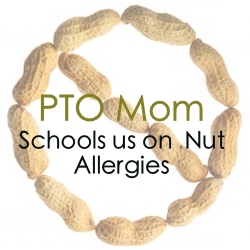Welcome to the NEW food allergy advice column, Get “Schooled” on Food Allergies with PTO Mom.
Planning school events are part of being in the PTO but when food is involved, it can make you, well, a little nuts! Common misconceptions with food allergies, how to communicate with teachers and other parents about your child’s allergies, and solutions to common problems involving food allergies in school are just some of the questions I can help you find the answers to.
I myself, am a mother of two; one of which has severe nut allergies. Most of the problems you may have, I either am going through or have went through at some point with my child’s school. I am here to help, educate and inform.
So let’s begin with, What happens when someone has a food allergy?
The body’s normal immune system is designed to fight infections. However, when someone is allergic to a type of food, it’s immune system goes into overdrive due to a reaction from the proteins of the particular food. When an allergic person ingests the allergen, the body thinks the proteins are harmful which in turn causes the immune system to fight back, as if it was an infection.
An allergic reaction can cause someone to have: wheezing/trouble breathing, coughing, throat tightening, nausea/vomiting, diarrhea, itchy/swollen eyes and/or hives.
When/if you have an allergic reaction in school, it is extremely important for you to have an epipen (or epipen jr) in the building. If you feel comfortable with carrying one and know how to use it, I advise you to carry one. Most school district will allow a student to self carry (and self administer) if the parent agrees, has a note signed by a doctor saying you should carry at all times and if the student knows how to use it themselves.
To find out if your school district allows self carrying and/or self administration of epipen (epipen jr), go to you school district’s board of education superintendent or simply ask the school’s nurse or principal.
Having nut allergies doesn’t have to slow you down. You can still live a fulfilling life. If we can thrive, so can you!
Have a question regarding Peanut, Tree Nut or Other food allergies in school? Want to suggest a topic for me to discuss? Follow Me on Facebook @ www.facebook.com/ptomom or Contact me @ pto_mom@aol.com and follow my Inspiredeats column here.
Get “Schooled” on Food Allergies With PTO Mom!


RT @atxfoodblogs: Get “Schooled” on Food Allergies with PTO Mom.: Welcome to the NEW food allergy advice col… http://t.co/x0Px2ymjfH via @MyInspiredEats
Hi there,
How do you know your child has a nut allergy? I believe mine is sensitive to peanuts but it hasn’t shown up on blood tests yet. Do you know if there are some similar allergies that look like peanut ones?
We’re so Lost and confused!
The first sign of an allergic reaction is showing skin irritations (rash, hives, etc) when touching or ingesting the peanut. Although everyone is different and reacts in different ways, those are the most common. Blood tests are not completely 100% accurate because they simply only test the possiblitiy of a reaction. I suggest contacting a pediatric allergic and request to have a skin testing done for ALL nuts (peanuts and all tree nuts). This way they can rule out anything that it isn’t. If by chance, all of them come up negative, ask to have a food challenge done. The doctor can do it right in the office. This way, they can see if your child is reacting to certain foods that you may think he/she is allergic to. I hope this helps. If you have any other questions, don’t hesitate to ask.